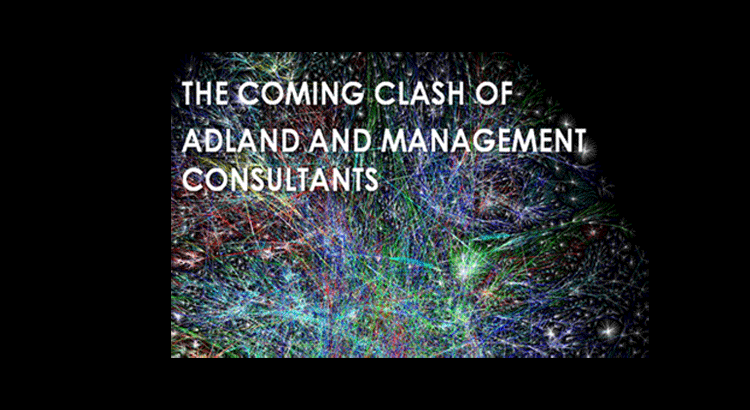Everybody wants to join the digital party – even the management consultants: digital agencies beware!
The borders are blurring between management consultants and the marketing world are beginning to blur. Previously, the big ‘firms’ – the McKinseys and Boston Consulting Groups of the world focussed on dealing with the CEO and the board only, producing the perfect strategy slide deck, but leaving the grubby work of implementation to others. The consultancies even have a word for it: they focussed on ‘UPSTREAM’, leaving other to do the ‘DOWNSTREAM’ work.
But the consultancies are changing – moving ‘downstream’, as they try to position themselves as the guys (and girls) who can deliver the growth agenda for companies. The reason why consultancies are now interested in marketing, and in particular digital marketing and marketing technologies are interesting – and have serious ramifications for the digital agencies of this world.
The consultancies are connected directly to the board and the CEO
Think in terms of ‘UPSTREAM’ in a business. This is the high-end strategy work, which is the bread and butter of agencies. The global management consulting firms are very good at global change programmes and see them through for the three to five years. In the past, the emphasis was on an engagement model based on a great slide deck, and a big cheque, and leave the implementation to others.
But today, business transformation – means tech transformation and digital marketing transformation. Technology is about creating customer experience – and customer experience is where the CEO and board are at. They want to know how to get there from here.
Digital transformation is quickly becoming one of the biggest buzzwords. Most digital transformation efforts to-date have been focused on technology and infrastructure, which is only part of the equation.
Real transformation requires an executive commitment. It requires an understanding of the customer journey and a real assessment of the capabilities required to deliver the customer experience. This means creating new roles, capabilities, and processes, and allocating the necessary resources to enable new and better consumer experiences.
So digital transformation is huge. It means strategy and organisation. It also campaign management in an always on world. It means data and analytics, content and so on.
This work automatically flows ‘DOWNSTREAM’ to digital implementations, innovation, customer experience, social media, and business design. Bu this is the realm of adland – and adland is not normally dealing at board level.
Historically, these ‘DOWNSTREAM’ activities are an activation of the strategy work of the management consultancies, and are often implemented at tactical level by advertising and digital agencies. Now, the consultancies see the opportunity to create measurable impact for their clients – and want to move ‘DOWNSTREAM’.
The consumer is the catalyst behind the shift
Customer expectations are sky high, and the operating models are under scrutiny. A lot of large organisations are totally paralysed with this new digital world. The explosion of digital and martech means that CEOs often don’t know who to turn to. They are trying to answer:
- What is digital?
- What is digital transformation?
- Can it save me money?
- What sort of organisation structures are required to make it work?
Management consultancies are now moving ‘DOWNSTREAM’ to offer a new package: ‘we can accelerate and develop you capabilities, and help you get on their feet in this digital world. We can show ‘you’ how to become an agile organisation while still delivering results‘.
Underestimate them at your peril
All consultancies have a backgrounds in strategy, systems and processes. In the 1990s, the big emphasis was on ERP, focussing is focused on back-office functions such as finance, HR and manufacturing while the sales and marketing functions were largely ignored. Finance, manufacturing, even the bulk of HR, may be complex functions, but for the most part, they’re highly standardised and stable. In the case of finance for public companies, it’s regulated. The value of ERP for other corporate functions has been the systemisation of processes – businesses can control their processes for finance, manufacturing, and HR, and bend the participants to their will.
However, this was not possible with marketing – until recently. Today, the promise is that digital transformation will take a whole bunch of different marketing technologies and make them work as a whole by collecting structured data on marketing prospects who were not customers. There’s a huge new opportunity for a focus on “data” — and the web is overflowing with data.
And this is what management consultancies are good at: making sense of tonnes of data, and turning it into strategy and tactics.
Marketing is not ERP
The modern marketing landscape is in constant flux: it is the antithesis of stability. The channels are still rapidly evolving, with new ones being invented every week, making it hard to standardise. Marketers don’t want their customer experiences to be standardised against their competitors. You can’t dictate process to your prospects and customers. There’s almost always tremendous variation among customers – and one size doesn’t fit all.
So, the consultants are moving in as their target market works out how to reshape their businesses and create growth from the digital revolution. The consulting firms to vastly expand their digital offering – and targetting the same youngsters who prefer the likes of Google, Facebook or even start-ups. They are trying to hire software developers, analysts, data scientists – just like the digitally focussed agencies of the world.
What is the new offerings from the big management consultancies?
The new world of management consulting that is taking the previous territory of the agencies is a mix of the following items – both ‘UPSTREAM’ and ‘DOWNSTREAM’.
- Advice: taking client every step of the way to digital transformation by assessing the business, technologies and performance, along with the changing digital landscape.
- Operating Models as the path to digital transformation: defining and set up an entirely new operating process for digital business, with the promise of digital capability becoming a competitive advantage.
- Performance Improvement: Creating a value framework for looking at all digital channels to see how well digital is working. Develop KPIs that to drive success.
- Setting up infrastructure: Building the capability to produce, manage and deliver multi-channel, multi-lingual, multi-territory content, and creating new sites and campaigns at speed and at scale.
- Organisational Technology Adoption: choosing the right systems and converting people to digital, by educating and upskill teams around digital, getting them to adopt the
- Content Strategy: Design a content strategy and a model for content creation, to deliver it across all channels, and to manage it once it’s out.
- Vendor Selection & RFP: Use the understanding of the business, existing technologies and needs to create RFPs to select the right vendors and technologies.
- Platform Build and Implementation: Taking the digital plan and make it a reality by planning, designing and building a platform, integrating the technologies,publishing the content and testing it.
- Analytics: Integrating web and mobile analytics into a digital platform to gather the data with defined measurement frameworks for measurement and optimisation.
- Content Migration and Testing: Making sure it all gets transferred and works all works.
And of course, the Project Management to handle the entire process implementation to deliver digital projects.
‘DOWNSTREAM’ and ‘UPSTREAM’ are now colliding
There used to be a chasm between management consulting and adland. It used to be a ‘white space’, but now it’s becoming more crowded – a rush to the centre is taking place. For the first time, both adland and the management consultants are vying for the same opportunities.
Whoever will in this new ‘white space’ is the one who can convince the board that its has the ‘digital’ chops to create growth and innovation, but most of all, to create value for the customer, because that is where the revolution is starting.
And knowing the customer is where adland is strong.




